This site uses cookies as defined in our Cookie Policy, by continuing to use this site you agree to their use.
Continue
| Arrive | Depart | ||||||
| 29th29 | MarMar | 202525 | Yokohama, Japan, embark on the Queen Elizabeth | ||||
| In 1853, a fleet of four American warships under Commodore Matthew Perry sailed into the bay of Tokyo (then Edo) and presented the reluctant Japanese with the demands of the U.S. government for the opening of diplomatic and commercial relations. The following year Perry returned and first set foot on Japanese soil at Yokohama—then a small fishing village on the mudflats of Tokyo bay. Two years later New York businessman Townsend Harris became America's first diplomatic representative to Japan. In 1858 he was finally able to negotiate a commercial treaty between the two countries; part of the deal designated four locations—one of them Yokohama—as treaty ports. In 1859 the shogunate created a special settlement in Yokohama for the growing community of merchants, traders, missionaries, and other assorted adventurers drawn to this exotic new land of opportunity. The foreigners (predominantly Chinese and British, plus a few French, Americans, and Dutch) were confined here to a guarded compound about 5 square km (2 square miles)—placed, in effect, in isolation—but not for long. Within a few short years the shogunal government collapsed, and Japan began to modernize. Western ideas were welcomed, as were Western goods, and the little treaty port became Japan's principal gateway to the outside world. In 1872 Japan's first railway was built, linking Yokohama and Tokyo. In 1889 Yokohama became a city; by then the population had grown to some 120,000. As the city prospered, so did the international community and by the early 1900s Yokohama was the busiest and most modern center of international trade in all of East Asia. Then Yokohama came tumbling down. On September 1, 1923, the Great Kanto Earthquake devastated the city. The ensuing fires destroyed some 60,000 homes and took more than 40,000 lives. During the six years it took to rebuild the city, many foreign businesses took up quarters elsewhere, primarily in Kobe and Osaka, and did not return. Over the next 20 years Yokohama continued to grow as an industrial center—until May 29, 1945, when in a span of four hours, some 500 American B-29 bombers leveled nearly half the city and left more than half a million people homeless. When the war ended, what remained became—in effect—the center of the Allied occupation. General Douglas MacArthur set up headquarters here, briefly, before moving to Tokyo; the entire port facility and about a quarter of the city remained in the hands of the U.S. military throughout the 1950s. By the 1970s Yokohama was once more rising from the debris; in 1978 it surpassed Osaka as the nation's second-largest city, and the population is now inching up to the 3.5 million mark. Boosted by Japan's postwar economic miracle, Yokohama has extended its urban sprawl north to Tokyo and south to Kamakura—in the process creating a whole new subcenter around the Shinkansen Station at Shin-Yokohama. The development of air travel and the competition from other ports have changed the city's role in Japan's economy. The great liners that once docked at Yokohama's piers are now but a memory, kept alive by a museum ship and the occasional visit of a luxury vessel on a Pacific cruise. Modern Large as Yokohama is, the central area is very negotiable. As with any other port city, much of what it has to offer centers on the waterfront—in this case, on the west side of Tokyo Bay. The downtown area is called Kannai (literally, "within the checkpoint"); this is where the international community was originally confined by the shogunate. Though the center of interest has expanded to include the waterfront and Ishikawa-cho, to the south, Kannai remains the heart of town. Think of that heart as two adjacent areas. One is the old district of Kannai, bounded by Basha-michi on the northwest and Nippon-odori on the southeast, the Keihin Tohoku Line tracks on the southwest, and the waterfront on the northeast. This area contains the business offices of modern Yokohama. The other area extends southeast from Nippon-odori to the Moto-machi shopping street and the International Cemetery, bordered by Yamashita Koen and the waterfront to the northeast; in the center is Chinatown, with Ishikawa-cho Station to the southwest. This is the most interesting part of town for tourists. Whether you're coming from Tokyo, Nagoya, or Kamakura, make Ishikawa-cho Station your starting point. Take the South Exit from the station and head in the direction of the waterfront. | |||||||
| 30th30 | MarMar | 202525 | At Sea | ||||
| 31st31 | MarMar | 202525 | Aomori, Japan | Early Morning | Afternoon | ||
| Aomori's main event is its Nebuta Matsuri Festival,held August 2 to 7. People come to see illuminated floats of gigantic samurai figures paraded through the streets at night. Aomori's festival is one of Japan's largest, and is said to celebrate the euphoria of post-battle victory, and is thus encouraged to be noisier and livelier than you may have been exposed to in other Japanese festivals. Dancers, called heneto, run alongside the floats, dancing crazily, and you're encouraged to join in. Throughout the year you can enjoy delicious seafood from Aomori Bay, including Oma no Maguro (tuna of Oma), as well as delicious fruits and vegetables (particularly garlic). And come every summer, the town cuts loose to throw the decidedly wild Nebuta Matsuri festival, a frenzied, utterly unaccountable period when normal gets thrown to the wind. | |||||||
| 1st01 | AprApr | 202525 | At Sea | ||||
| 2nd02 | AprApr | 202525 | Sakaiminato, Japan | Early Morning | Afternoon | ||
| Sakaiminato is a small city almost totally surrounded by water: the Sea of Japan to the east, the Sakai Channel to the north and Lake Nakaumi to the west. Across the lake the towns of Matsue and Yasugi offer interesting experiences. Matsue is known as the “Town of Water” next to scenic Lake Shinji and Lake Nakaumi. It has one of the very few wooden castles that still remain in Japan. Touring the castle and boat rides on the Horikawa River and the castle’s moat are popular. Yasugi has the Adachi Museum of Art, a private museum that houses one of the finest collections of contemporary Japanese paintings, but also has a 165,000 square metres garden –with plants and rocks collected by the museum’s founder. Six different gardens show different scenarios depending on the season. These gardens have been selected as “Japan’s best garden” for several years. | |||||||
| 3rd03 | AprApr | 202525 | Busan, South Korea | Early Morning | Afternoon | ||
| White-sand city beaches and hot-spring resorts may not be everyone's first image of Korea, but these are what Koreans flock to Busan for all year. And there are plenty of opportunities for rest, relaxation, retail therapy, and even a touch of glamour every October with the Busan International Film Festival. Busan's beaches are the big summertime draw but there is plenty to be seen year round. Quintessential experiences include taking some rest and relaxation at a local spa and exploring the Beomeosa temple complex. | |||||||
| 4th04 | AprApr | 202525 | Nagasaki, Japan | Early Morning | Afternoon | ||
| Nagasaki city has developed into one of the most important port cities in Japan. During Japan’s period of isolation in the 17th century, Nagasaki played a prominent role in foreign trade relation and only a very few ports were open to restricted numbers of foreign traders. Even though Holland was a major country who conducted trading during this period, Dutch people were only allowed to stay in Dejima Island and were not allowed to have contact with the Japanese people. Today, you will still find the strong influence of Dutch and Chinese culture in the city which is very different from all other cities in Japan. In the more recent history, Nagasaki became the second city after Hiroshima to be destroyed by an atomic bomb towards the end of World War II. From the visit to Atomic bomb museum and peace memorial park, people could understand how chaotic the situation was and the agony that the people in the days have experienced from the damage inflicted by the atomic bomb. It continues to appeal to the world with their wish for world peace. | |||||||
| 5th05 | AprApr | 202525 | At Sea | ||||
| 6th06 | AprApr | 202525 | Shimizu, Japan | Early Morning | Early Evening | ||
| The salt and pepper cone of Japan's most famous natural landmark won’t fail to take your breath away, as it soars into the sky in a vision of spectacular symmetry. Make sure your camera is fully prepared before you dock in Shimizu’s port, where unparalleled views of the extraordinary Mount Fuji’s dramatic peak await. Take your time to soak up one of Japan's most iconic views, before dipping your toes into the rest of what this destination of tranquil temples has to offer. While there’s a bustling fish market, and a charming amusement park waiting close to the port, most new arrivals immediately set off in pursuit of the best views of Mount Fuji, or to see the stunning panorama on offer from the heights of the Kunozan Toshogu Shrine. Take the cable car up to the top, to experience the tranquillity around the forested shrine, and to enjoy its stunning architecture of deep scarlets and gleaming golds. You can also enjoy heart-stopping views out over the Bay of Suruga, and the tea plantations below. | |||||||
| 7th07 | AprApr | 202525 | Yokohama, Japan | Early Morning | Early Evening | ||
| In 1853, a fleet of four American warships under Commodore Matthew Perry sailed into the bay of Tokyo (then Edo) and presented the reluctant Japanese with the demands of the U.S. government for the opening of diplomatic and commercial relations. The following year Perry returned and first set foot on Japanese soil at Yokohama—then a small fishing village on the mudflats of Tokyo bay. Two years later New York businessman Townsend Harris became America's first diplomatic representative to Japan. In 1858 he was finally able to negotiate a commercial treaty between the two countries; part of the deal designated four locations—one of them Yokohama—as treaty ports. In 1859 the shogunate created a special settlement in Yokohama for the growing community of merchants, traders, missionaries, and other assorted adventurers drawn to this exotic new land of opportunity. The foreigners (predominantly Chinese and British, plus a few French, Americans, and Dutch) were confined here to a guarded compound about 5 square km (2 square miles)—placed, in effect, in isolation—but not for long. Within a few short years the shogunal government collapsed, and Japan began to modernize. Western ideas were welcomed, as were Western goods, and the little treaty port became Japan's principal gateway to the outside world. In 1872 Japan's first railway was built, linking Yokohama and Tokyo. In 1889 Yokohama became a city; by then the population had grown to some 120,000. As the city prospered, so did the international community and by the early 1900s Yokohama was the busiest and most modern center of international trade in all of East Asia. Then Yokohama came tumbling down. On September 1, 1923, the Great Kanto Earthquake devastated the city. The ensuing fires destroyed some 60,000 homes and took more than 40,000 lives. During the six years it took to rebuild the city, many foreign businesses took up quarters elsewhere, primarily in Kobe and Osaka, and did not return. Over the next 20 years Yokohama continued to grow as an industrial center—until May 29, 1945, when in a span of four hours, some 500 American B-29 bombers leveled nearly half the city and left more than half a million people homeless. When the war ended, what remained became—in effect—the center of the Allied occupation. General Douglas MacArthur set up headquarters here, briefly, before moving to Tokyo; the entire port facility and about a quarter of the city remained in the hands of the U.S. military throughout the 1950s. By the 1970s Yokohama was once more rising from the debris; in 1978 it surpassed Osaka as the nation's second-largest city, and the population is now inching up to the 3.5 million mark. Boosted by Japan's postwar economic miracle, Yokohama has extended its urban sprawl north to Tokyo and south to Kamakura—in the process creating a whole new subcenter around the Shinkansen Station at Shin-Yokohama. The development of air travel and the competition from other ports have changed the city's role in Japan's economy. The great liners that once docked at Yokohama's piers are now but a memory, kept alive by a museum ship and the occasional visit of a luxury vessel on a Pacific cruise. Modern Large as Yokohama is, the central area is very negotiable. As with any other port city, much of what it has to offer centers on the waterfront—in this case, on the west side of Tokyo Bay. The downtown area is called Kannai (literally, "within the checkpoint"); this is where the international community was originally confined by the shogunate. Though the center of interest has expanded to include the waterfront and Ishikawa-cho, to the south, Kannai remains the heart of town. Think of that heart as two adjacent areas. One is the old district of Kannai, bounded by Basha-michi on the northwest and Nippon-odori on the southeast, the Keihin Tohoku Line tracks on the southwest, and the waterfront on the northeast. This area contains the business offices of modern Yokohama. The other area extends southeast from Nippon-odori to the Moto-machi shopping street and the International Cemetery, bordered by Yamashita Koen and the waterfront to the northeast; in the center is Chinatown, with Ishikawa-cho Station to the southwest. This is the most interesting part of town for tourists. Whether you're coming from Tokyo, Nagoya, or Kamakura, make Ishikawa-cho Station your starting point. Take the South Exit from the station and head in the direction of the waterfront. | |||||||
| 8th08 | AprApr | 202525 | At Sea | ||||
| 9th09 | AprApr | 202525 | Beppu, Kyushu Island, Oita, Japan | Early Morning | Afternoon | ||
| 10th10 | AprApr | 202525 | At Sea | ||||
| 11th11 | AprApr | 202525 | Busan, South Korea | Early Morning | Afternoon | ||
| White-sand city beaches and hot-spring resorts may not be everyone's first image of Korea, but these are what Koreans flock to Busan for all year. And there are plenty of opportunities for rest, relaxation, retail therapy, and even a touch of glamour every October with the Busan International Film Festival. Busan's beaches are the big summertime draw but there is plenty to be seen year round. Quintessential experiences include taking some rest and relaxation at a local spa and exploring the Beomeosa temple complex. | |||||||
| 12th12 | AprApr | 202525 | Nagasaki, Japan | Early Morning | Early Evening | ||
| Nagasaki city has developed into one of the most important port cities in Japan. During Japan’s period of isolation in the 17th century, Nagasaki played a prominent role in foreign trade relation and only a very few ports were open to restricted numbers of foreign traders. Even though Holland was a major country who conducted trading during this period, Dutch people were only allowed to stay in Dejima Island and were not allowed to have contact with the Japanese people. Today, you will still find the strong influence of Dutch and Chinese culture in the city which is very different from all other cities in Japan. In the more recent history, Nagasaki became the second city after Hiroshima to be destroyed by an atomic bomb towards the end of World War II. From the visit to Atomic bomb museum and peace memorial park, people could understand how chaotic the situation was and the agony that the people in the days have experienced from the damage inflicted by the atomic bomb. It continues to appeal to the world with their wish for world peace. | |||||||
| 13th13 | AprApr | 202525 | Kagoshima, Japan | Early Morning | Afternoon | ||
| Kagoshima city is the capital of Kagoshima prefecture and also Kyushu’s southernmost major city. This city is often compared to its Italian sister city Naples, due to its’s similarities such as mild climate and active volcano, Sakurajima. Sakurajima is one of the most renowned active volcanos not only in Japan but also in the whole entire world. This smoking Sakurajima is centred in Kinko Bay and is one of the main symbols of this prefecture. We cannot talk about Sakurajima without the history of continuous eruption. Sakurajima used to be an isolated island; however, the land has banded together with Osumi peninsula from the eruption in 1914. You may have a chance to see the smoke coming from the top of Sakurajima depending on the weather condition. Not only does the scenery of Sakurajima represent the beauty of Kagoshima City but Senganen garden is also symbolic to elegance in the Kagoshima region. This Japanese garden was constructed by a feudal lord, Mitsuhisa Shimazu, as a guest house of the Kagoshima castle which attracts many visitors for its splendid view. | |||||||
| 14th14 | AprApr | 202525 | Kochi, Japan | Early Morning | Early Evening | ||
| 15th15 | AprApr | 202525 | At Sea | ||||
| 16th16 | AprApr | 202525 | Yokohama, Japan, disembark the Queen Elizabeth | ||||
| In 1853, a fleet of four American warships under Commodore Matthew Perry sailed into the bay of Tokyo (then Edo) and presented the reluctant Japanese with the demands of the U.S. government for the opening of diplomatic and commercial relations. The following year Perry returned and first set foot on Japanese soil at Yokohama—then a small fishing village on the mudflats of Tokyo bay. Two years later New York businessman Townsend Harris became America's first diplomatic representative to Japan. In 1858 he was finally able to negotiate a commercial treaty between the two countries; part of the deal designated four locations—one of them Yokohama—as treaty ports. In 1859 the shogunate created a special settlement in Yokohama for the growing community of merchants, traders, missionaries, and other assorted adventurers drawn to this exotic new land of opportunity. The foreigners (predominantly Chinese and British, plus a few French, Americans, and Dutch) were confined here to a guarded compound about 5 square km (2 square miles)—placed, in effect, in isolation—but not for long. Within a few short years the shogunal government collapsed, and Japan began to modernize. Western ideas were welcomed, as were Western goods, and the little treaty port became Japan's principal gateway to the outside world. In 1872 Japan's first railway was built, linking Yokohama and Tokyo. In 1889 Yokohama became a city; by then the population had grown to some 120,000. As the city prospered, so did the international community and by the early 1900s Yokohama was the busiest and most modern center of international trade in all of East Asia. Then Yokohama came tumbling down. On September 1, 1923, the Great Kanto Earthquake devastated the city. The ensuing fires destroyed some 60,000 homes and took more than 40,000 lives. During the six years it took to rebuild the city, many foreign businesses took up quarters elsewhere, primarily in Kobe and Osaka, and did not return. Over the next 20 years Yokohama continued to grow as an industrial center—until May 29, 1945, when in a span of four hours, some 500 American B-29 bombers leveled nearly half the city and left more than half a million people homeless. When the war ended, what remained became—in effect—the center of the Allied occupation. General Douglas MacArthur set up headquarters here, briefly, before moving to Tokyo; the entire port facility and about a quarter of the city remained in the hands of the U.S. military throughout the 1950s. By the 1970s Yokohama was once more rising from the debris; in 1978 it surpassed Osaka as the nation's second-largest city, and the population is now inching up to the 3.5 million mark. Boosted by Japan's postwar economic miracle, Yokohama has extended its urban sprawl north to Tokyo and south to Kamakura—in the process creating a whole new subcenter around the Shinkansen Station at Shin-Yokohama. The development of air travel and the competition from other ports have changed the city's role in Japan's economy. The great liners that once docked at Yokohama's piers are now but a memory, kept alive by a museum ship and the occasional visit of a luxury vessel on a Pacific cruise. Modern Large as Yokohama is, the central area is very negotiable. As with any other port city, much of what it has to offer centers on the waterfront—in this case, on the west side of Tokyo Bay. The downtown area is called Kannai (literally, "within the checkpoint"); this is where the international community was originally confined by the shogunate. Though the center of interest has expanded to include the waterfront and Ishikawa-cho, to the south, Kannai remains the heart of town. Think of that heart as two adjacent areas. One is the old district of Kannai, bounded by Basha-michi on the northwest and Nippon-odori on the southeast, the Keihin Tohoku Line tracks on the southwest, and the waterfront on the northeast. This area contains the business offices of modern Yokohama. The other area extends southeast from Nippon-odori to the Moto-machi shopping street and the International Cemetery, bordered by Yamashita Koen and the waterfront to the northeast; in the center is Chinatown, with Ishikawa-cho Station to the southwest. This is the most interesting part of town for tourists. Whether you're coming from Tokyo, Nagoya, or Kamakura, make Ishikawa-cho Station your starting point. Take the South Exit from the station and head in the direction of the waterfront. | |||||||













The images shown are for illustration purposes only and may not be an exact representation of what you find on the ship.
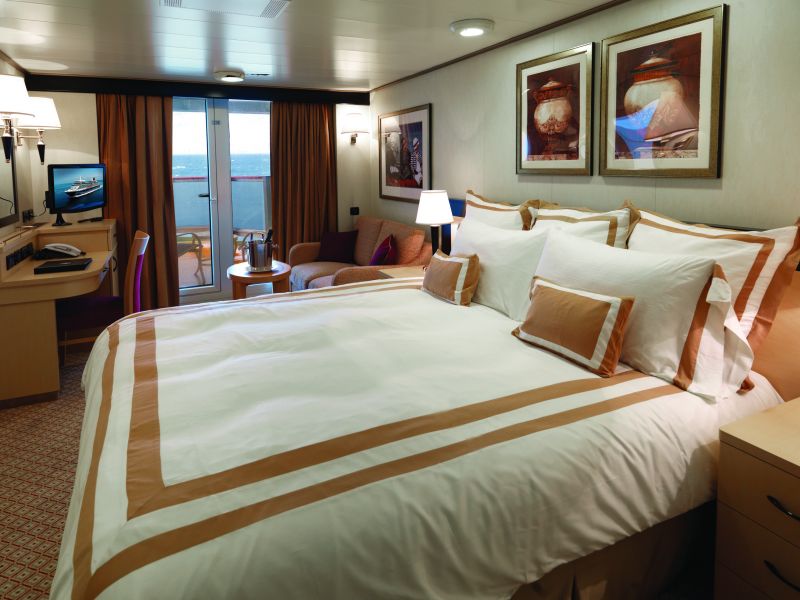
| Grade Code | From | To | |
| CB | Balcony | £2,909 | £3,179 |
| CA | Balcony | £2,999 | £3,279 |
| BF | Balcony | £3,079 | £3,359 |
| BE | Balcony | £3,119 | £3,399 |
| BC | Balcony | £3,149 | £3,429 |
| BD | Balcony | £3,149 | £3,429 |
| BB | Balcony | £3,219 | £3,509 |
| BA | Balcony | £3,309 | £3,599 |
Drink in the outside air with your own private balcony adjoined to your Britannia Stateroom.
Each Britannia Balcony stateroom includes:
Satellite TV, tea & coffee making facilities and a mini-bar.
An invigorating shower and complimentary Penhaligon's toiletries.
Complimentary robe and slippers for everyone in your party.
Nightly turndown service, including a chocolate on your pillow.
Sparkling wine to welcome you on board.
Your own stateroom steward for the duration of your stay.
A spacious balcony overlooking the ocean with table and chairs to relax in.
24 hour room service.
Hairdryer & safe.
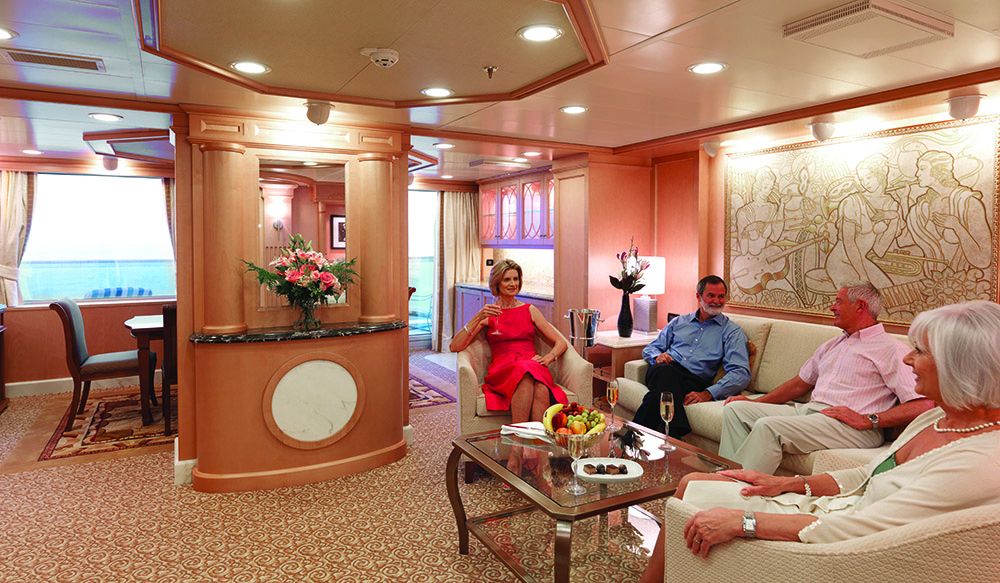
| Grade Code | From | To | |
| Q1 | Grand Suite | £21,369 | £21,369 |
Indulge in the privacy of your own expansive deck and an exquisite marble bathroom.
Each Queens Grill Master Suite includes:
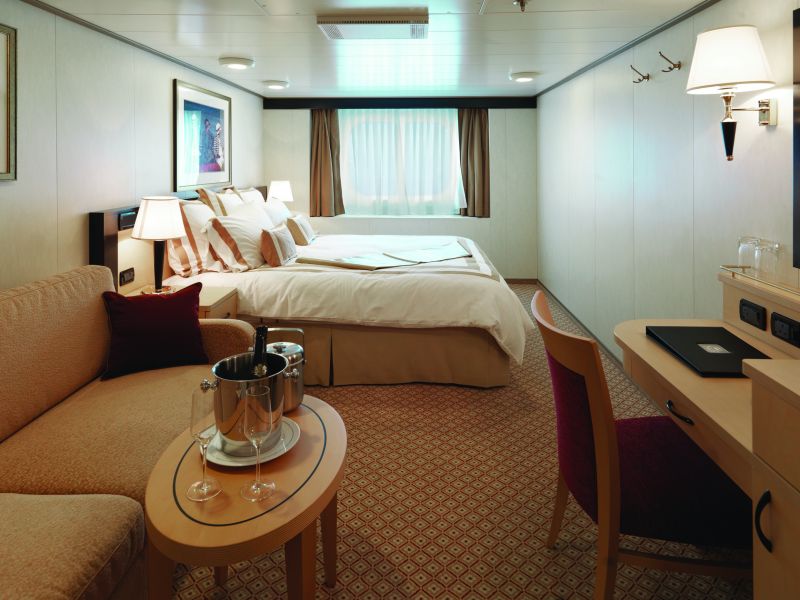
| Grade Code | From | To | |
| FC | Oceanview | £2,759 | £2,999 |
| FB | Oceanview | £2,809 | £3,049 |
| EF | Oceanview | £2,849 | £3,089 |
| EB | Oceanview | £2,909 | £3,149 |
| EC | Oceanview | £2,909 | £3,149 |
Awaken each day to glorious natural daylight and a window overlooking the ocean. Some oceanview staterooms have an obstructed view.
Each Britannia Oceanview stateroom includes:
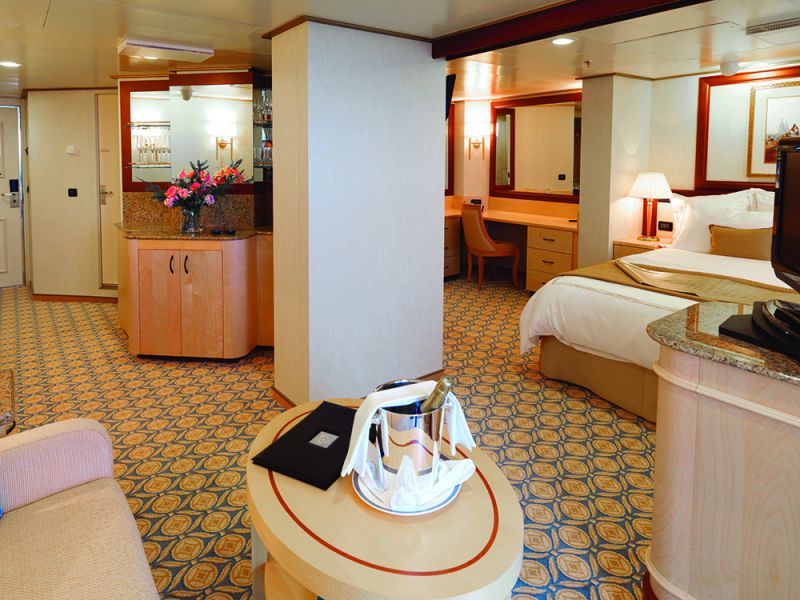
| Grade Code | From | To | |
| Q4 | Penthouse | £9,179 | £9,179 |
| Q3 | Penthouse | £9,599 | £9,599 |
Stay in an enviable Midships position and savour freedom dining in the Queens Grill restaurant.
Each Queens Grill Penthouse includes:
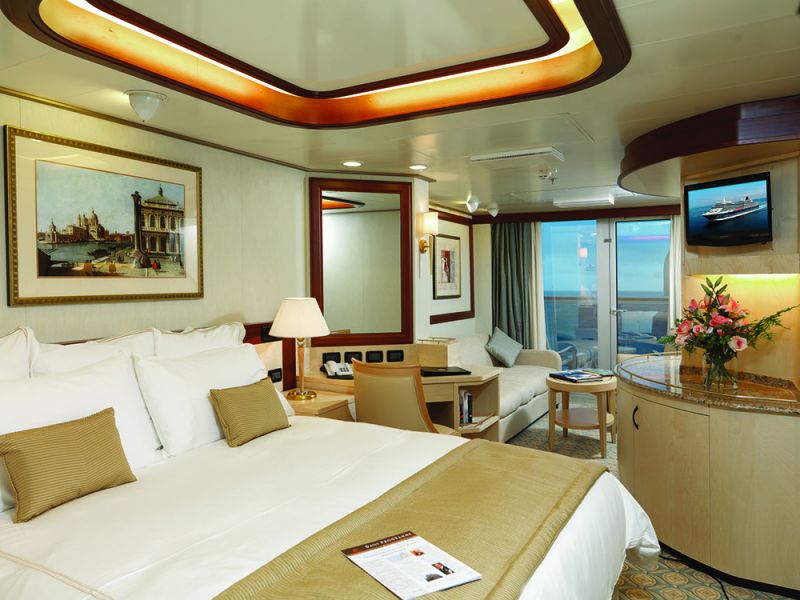
| Grade Code | From | To | |
| P2 | Princess Suite | £6,799 | £6,799 |
| P1 | Princess Suite | £7,219 | £7,219 |
Take your meals in the Princess Grill restaurant and enjoy Illy coffee in your suite.
Each Princess Grill Suite includes:
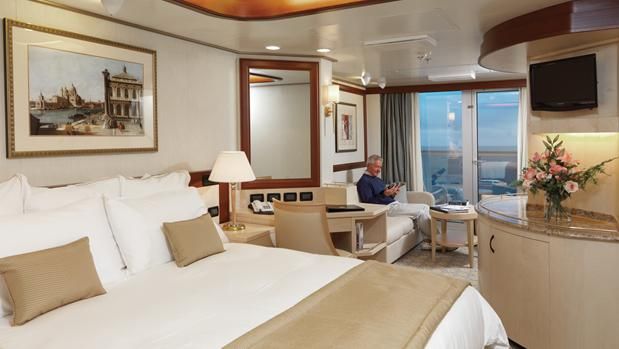
| Grade Code | From | To | |
| Q6 | Queens Suite | £8,069 | £8,069 |
| Q5 | Queens Suite | £8,749 | £8,749 |
Indulge in a fully stocked bar, your own private butler and a spacious on board suite.
Each Queens Grill Suite includes:
The images shown are for illustration purposes only and may not be an exact representation of what you find on the ship.
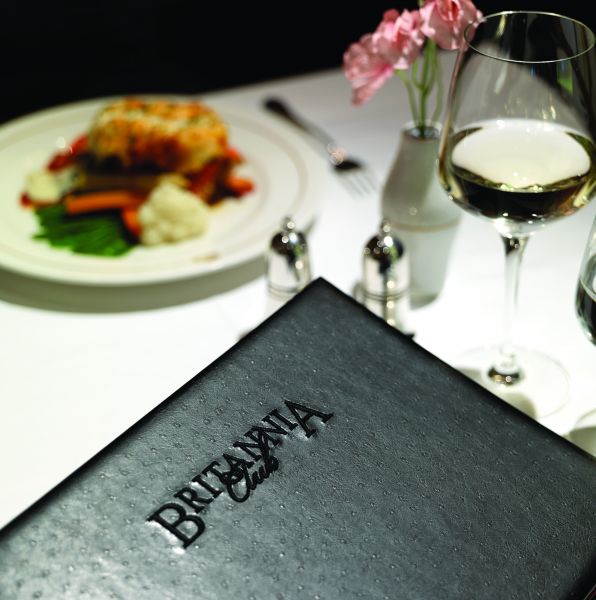
Our main restaurant invites you to enjoy breakfast, lunch and dinner with a real sense of occasion.
Dining is a highlight of each Cunard voyage and the Britannia Restaurant ensures that it's unforgettable, especially on Gala Evenings. Experience a stylish and vibrant atmosphere and be tempted by freshly prepared dishes which range from twists on traditional favourites to contemporary selections. If you decide to join us here for breakfast or lunch you’ll find it traditional and relaxed, whereas at dinner this glamorous venue really sparkles.
Britannia Club guests will appreciate the more intimate surroundings of this stylish restaurant.
As you’d expect, menus change daily and in addition to the full selection from the Britannia restaurant you can savour a range of enhancements for an extraordinary dining experience.
Guests can now choose to reserve a table at any time of the evening alongside the more traditional early and late seating options.
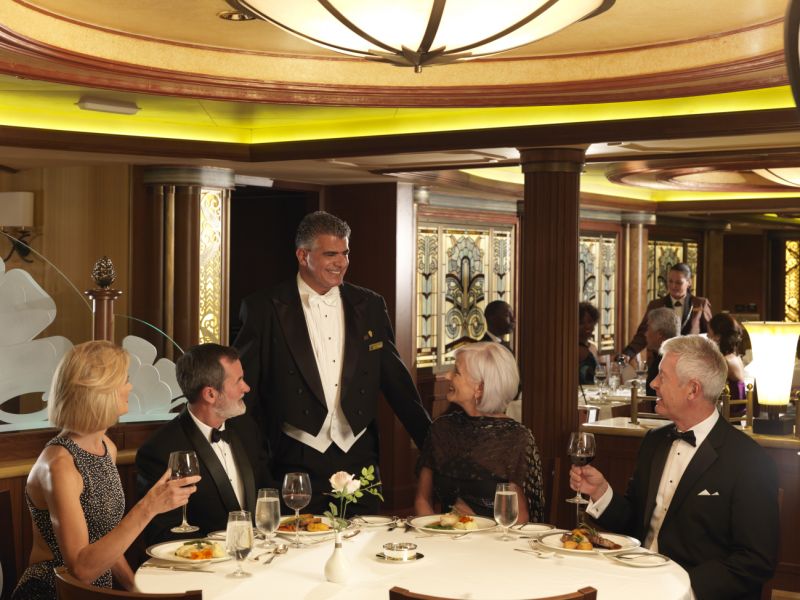
As a Princess Grill guest dining here you’ll appreciate style and elegance, whatever the occasion.
As a guest in our Princess Grill suites you may choose to join us in the elegant Princess Grill for breakfast, lunch or dinner. Whatever the occasion you’ll always feel special with personal and intuitive service. Join us for dinner anytime from 6.30 to 9.00, whenever suits you best.
Choose from dishes such as Goats Cheese Souffle or Yellow Fin Tuna Tartare to start, perhaps followed by Rack of Dartmoor Lamb or Pan Roasted Halibut, all rounded off with a delicious Chocolate Pecan Terrine.
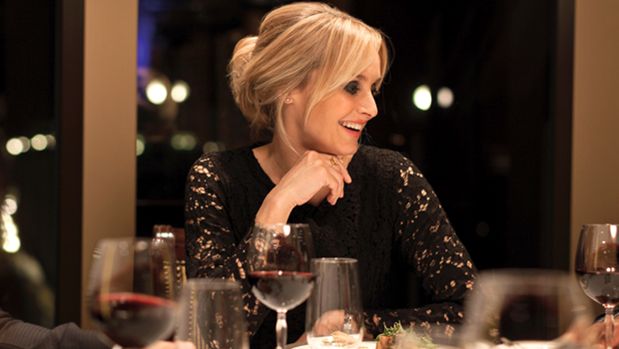
In the beautifully appointed Queens Grill you can savour the ultimate in dining sophistication.
As a guest in our Queens Grill suites you’ll enjoy a remarkable dining experience. Whether it’s for breakfast, lunch or dinner you’ll savour flawless service and impeccably prepared dishes ranging from exquisite contemporary creations to Cunard Classics. Enjoy the daily menu or go A La Carte, you choose. This evening you may relish a Terrine of Kentish Goats Cheese or Devon Crab Cannelloni, followed by Wild Atlantic Turbot or Onley Grounds Chateaubriand, rounded off with Grand Marnier Souffle.
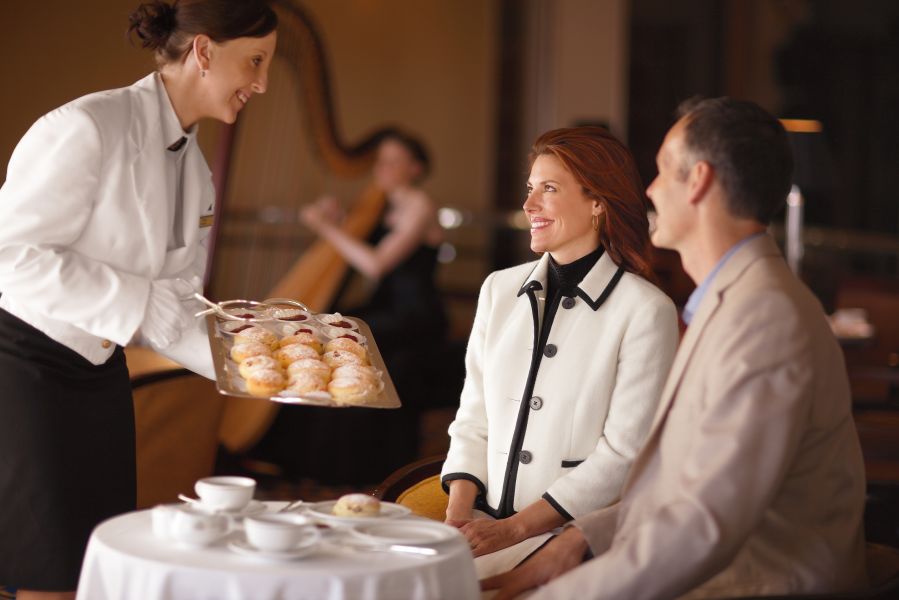
Experience the grandeur of the largest ballroom at sea and the social hub of the ship.
You'll soon discover that it’s the elegant Queens Room which plays centre stage to so much of your social calendar and is frequently a hub of activity. By day this stunning venue hosts dancing classes, fencing, music recitals and our grandest interpretation of Afternoon Tea. When darkness falls join us as the orchestra strikes up for an evening of dancing or simply to enjoy the atmosphere over a cocktail. And it's on Gala Evenings when you'll really love the sparkling sense of occasion here.
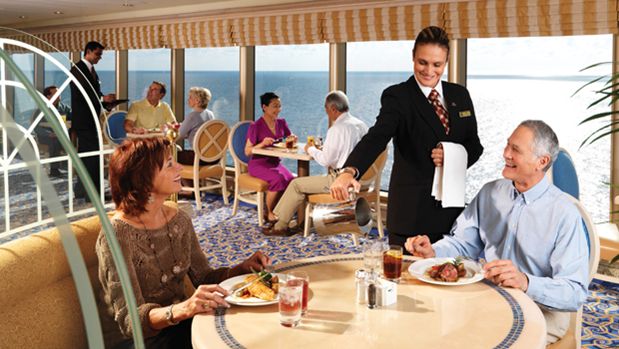
Should you prefer a club sandwich or a light bite in the afternoon head for the Lido restaurant where buffet dining is available throughout the day. By evening it transforms into one of Cunard's regional venues: Asado is a South American Grill; Jasmine serves up exquisite Asian cuisine; while Aztec tempts you with interpretations of Mexican classics.
The images shown are for illustration purposes only and may not be an exact representation of what you find on the ship.
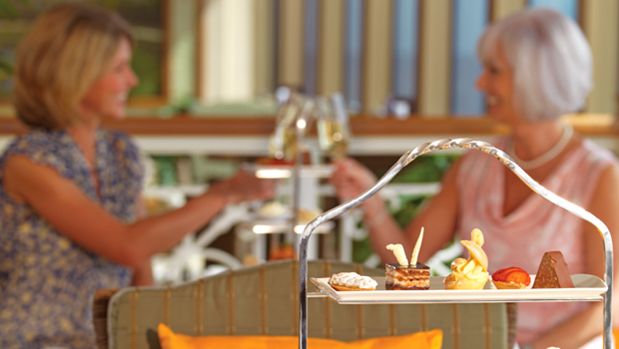
Join us in this refined and airy lounge to unwind, enjoy the sun and watch the world go by.
You'll soon discover that the Garden Lounge on Queen Elizabeth is the perfect place to unwind, with its relaxed and airy feel along with design touches inspired by the conservatories at Kew Gardens. This versatile lounge is known for its relaxed ambiance and is flooded with natural daylight so come here to enjoy an informal breakfast, to savour a refreshing cocktail or for a delicious afternoon tea. You may also decide to join us here to watch live sports events.
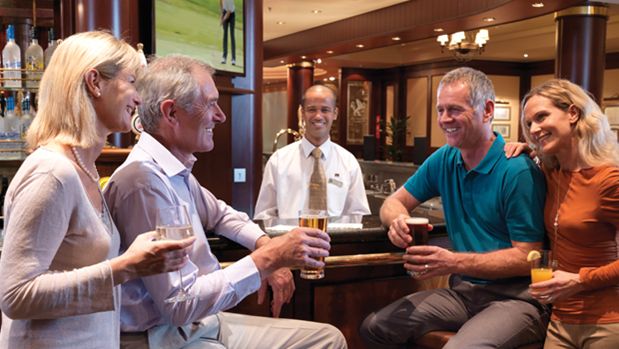
Enjoy the unique atmosphere of a real pub with great beers, scrumptious lunches, live sport and pub games.
A popular venue on each member of the Cunard fleet, the Golden Lion is a warm, inviting space for a daytime brew, a hearty lunch, or an evening pub quiz.
Choose a pub classic from the food menu - included at no extra cost as one of your dining options - and wash it down with one of the Golden Lion's thirst-quenching range of ales, lagers and ciders, including a range of drinks exclusive to Cunard.
Relax in our comfortable booths with your chosen beverage and watch the world sail by. Challenge yourself and your travelling companions with a game of darts, join one of our regular pub quizzes or visit for an after-dinner drink and karaoke.
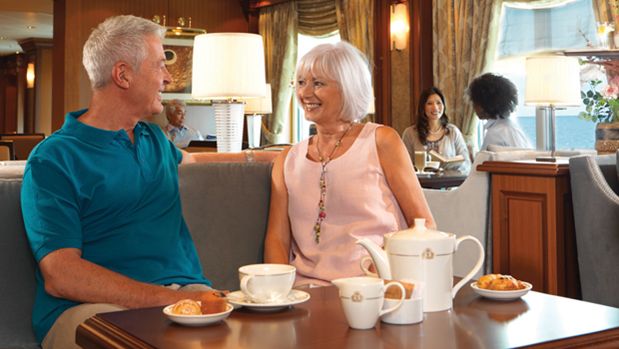
Located in a central position on Deck 2, overlooking the Grand Lobby, Cafe Carinthia is the perfect place to sit and relax watching the world go by. Sip specialty teas and coffees with an accompaniment of delicious pastries.
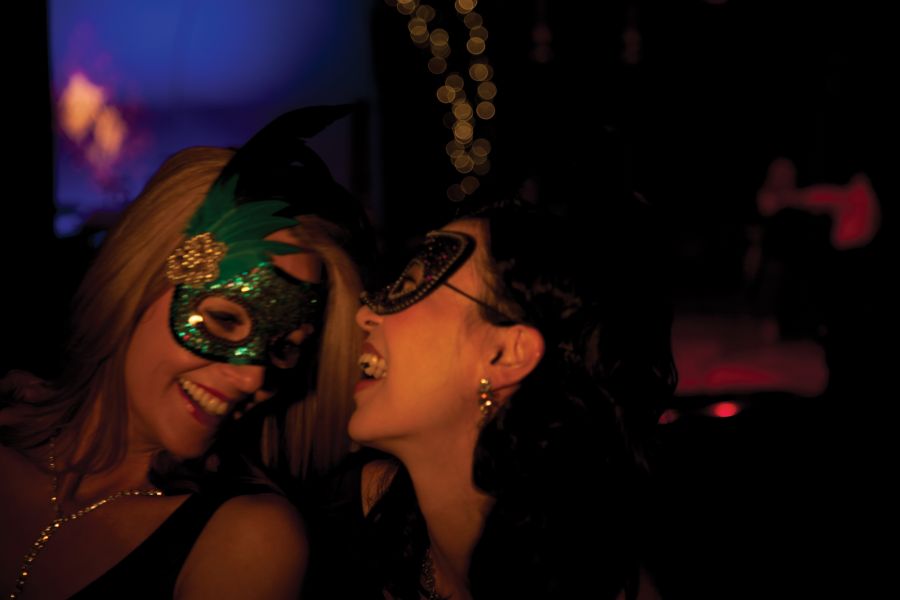
Royal night themed balls in the magnificent Queens Room Ballroom are your chance to don your formal dancing attire and take to the floor in a sea of glittering ball gowns and tuxedos accompanied by sounds from the marvellous orchestra.

Join us here by day for a range of inspiring activities or as night falls for music and dancing.
Blessed with exceptional views, the Yacht Club on Queen Victoria and Queen Elizabeth hosts many entertaining events. Join us here by day and return later to dance under the glow of the evening stars. As evening approaches, jazz fans in particular may find themselves here as the Yacht Club transitions into a lively pre- and post-dinner venue with superb live jazz. Later that evening those who love to party will relish the fact that the resident DJ and dance band play late into the night.
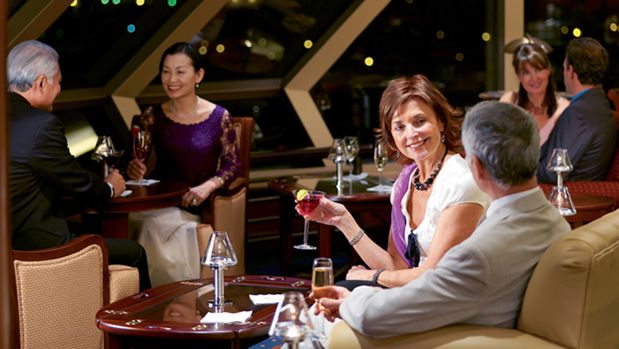
Succumb to the charms of this magical bar, which takes pride of place overlooking the bow of the ship.
Savour the view of the world as it unfurls across the bow from this stunning location and discover just why the Commodore Club is such a remarkable venue. Taking inspiration from our Cunard Commodores who have expertly steered the fleet, join us here to enjoy pre dinner cocktails. Admire the sun setting over the sparkling ocean as you relax to the soothing tones of the pianist. Enjoy a delicious signature martini or sample a cocktail inspired by one of our seven most decorated Commodores.
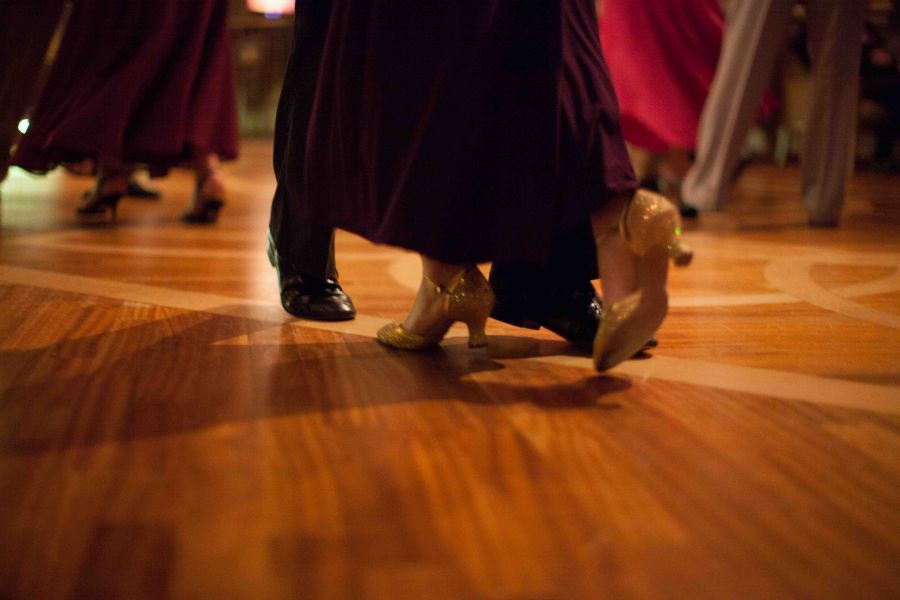
You'll find dancing in our magnificent Queens Room ballrooms a truly magical experience.
Our Queens Room ballrooms are quite simply the largest at sea. You’ll find it’s the perfect place to dance the night away under beautiful crystal chandeliers and to the company of a live orchestra. There is no better place for you to revel in the joy of dance than under the dramatic high ceiling and our sparkling Royal Night Themed Balls are always spectacular. And remember, our complimentary dance lessons are the perfect way to hone your skills and build your confidence.
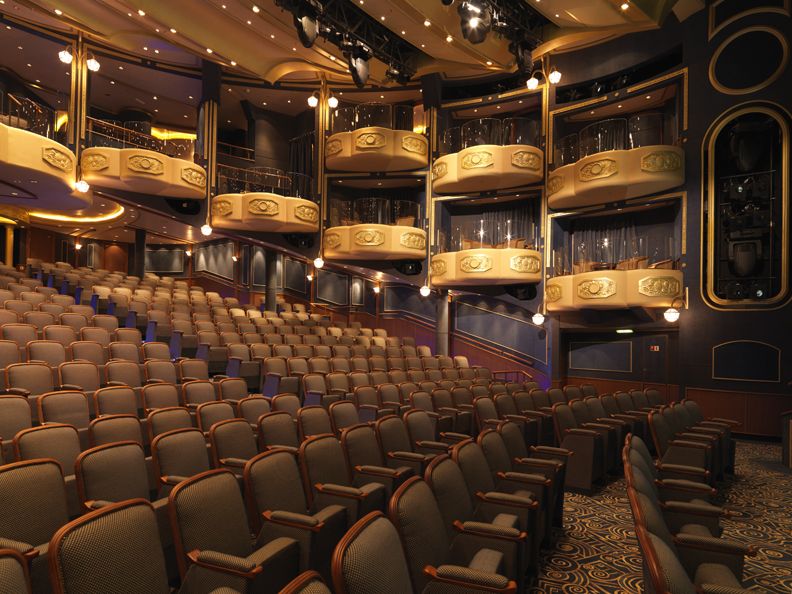
Experience the thrill of a vibrant music and dance extravaganza in our full sized theatres.
You'll find our elegant Royal Court Theatres as impressive as any in the West End or Broadway and they're the perfect setting for you to enjoy invigorating, high-tech dance productions. We're constantly introducing new shows performed by our highly talented Royal Cunard Singers and Dancers. Popular recent productions including the cutting-edge dance shows 'La Danza' and 'Rhythm of the Night,' which takes audiences on a magical journey through the sights and sounds of Latin America.
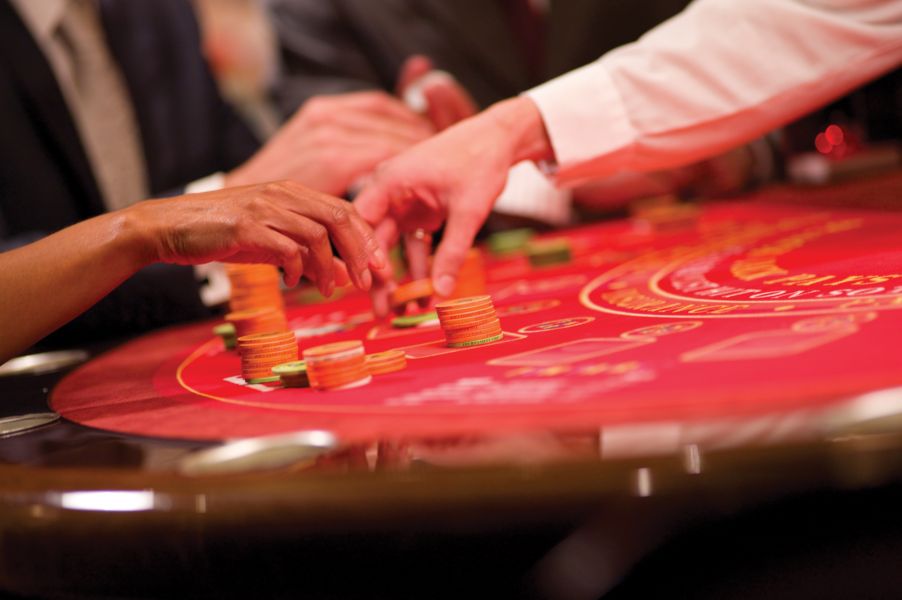
Join us in our Monte-Carlo inspired Casino where you’ll find a winning combination of elegance and excitement.
During the day meet our expert croupiers and take the chance to learn the rules and sharpen your game.
As night falls the casino comes alive. From first flutters to high-rollers, there’s something for everyone. Unleash your daring side with our wide selection of slots and tables or simply soak in the atmosphere whilst sipping on a Cunard Martini – the choice is yours.
The images shown are for illustration purposes only and may not be an exact representation of what you find on the ship.

Teenagers 13 to 17 will have a great time with the sports, discos and games we run around the ship.
Teens in your party will have a whale of a time in this dedicated club for 13 to 17 year-olds. They can enjoy deck sports, discos, gaming consoles, quizzes and much more - ensuring an action-packed holiday. They'll also appreciate the special Teen Zone area where they can challenge each other to the latest video games as well as the table tennis tournaments and team games we organise. Note that the exact age groupings will depend on the number of children travelling on any particular voyage.
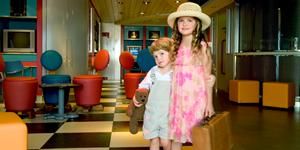
Enjoy your holiday even more, knowing that your little ones have a safe place to sleep each evening.
There's a great sense of freedom to be had when you can enjoy drinks, dinner or a show knowing that your little ones are sleeping soundly. Available on a first come first served basis, our free of charge Night Nursery equips you with a pager so we can contact you if need be or, if you let us know your plans, we'll come and find you. For that extra peace of mind professional childminders are on hand. Suitable for children aged 6 to 23 months and open from 6pm to 11pm.
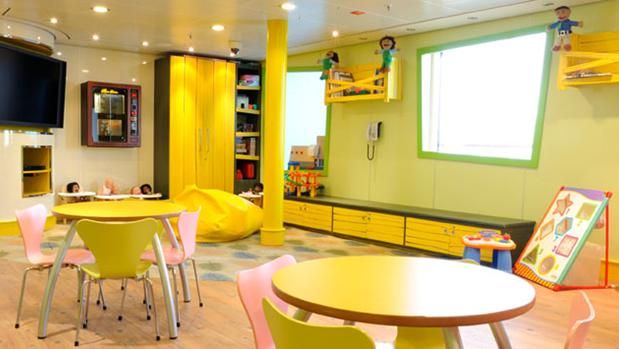
Children aged 2 to 7 will love the activities and themed days in this supervised haven.
The Play Zone is a fully supervised play area which younger members of your family will just love. They're sure to have a fun-filled holiday with the structured activities provided by our fully trained Youth Team - including themed days, arts and crafts, games, books, puzzles, toys and computer games. There's even a sheltered outdoor play area with a range of play equipment such as cars and tricycles. Infants from 6 months to 23 months are welcome to join in the fun, with parental supervision.
The images shown are for illustration purposes only and may not be an exact representation of what you find on the ship.
| 18 nights aboard the Queen Elizabeth | |||
| Choose FREE on-board spend, coach transfers or car parking (Cunard Fares only) | |||
| Complimentary daily afternoon tea | |||
| Evening entertainment & Broadway style shows | |||
| Upgrade to the Grills Experience | |||
| Tea, coffee, fruit juice is available 24 hours | |||
| 24-hour room service | |||
| Port Taxes and Fees | |||
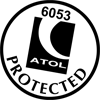 | ABTA and ATOL Protection* | ||
Date 29th Mar 2025 |
Nts 18 |
Please Call for Availability |
Date 29th Mar 2025 |
Nts 18 |
Please Call for Availability |
| Interior staterooms |  | ||
| LC | Single Inside |  | |
| GA | Deluxe Inside |  | |
| GB | Deluxe Inside |  | |
| GC | Deluxe Inside |  | |
| IA | Standard Inside |  | |
| ID | Standard Inside |  | |
| IE | Standard Inside |  | |
| IF | Standard Inside |  | |
| Oceanview staterooms |  | ||
| KC | Single Oceanview |  | |
| EB | Oceanview |  | |
| EC | Oceanview |  | |
| EF | Oceanview |  | |
| FB | Oceanview |  | |
| FC | Oceanview |  | |
| Balcony staterooms |  | ||
| A1 | Club Balcony |  | |
| A2 | Club Balcony |  | |
| BA | Balcony |  | |
| BB | Balcony |  | |
| BC | Balcony |  | |
| BD | Balcony |  | |
| BE | Balcony |  | |
| BF | Balcony |  | |
| CA | Balcony |  | |
| CB | Balcony |  | |
| Suite staterooms |  | ||
| P1 | Princess Suite |  | |
| P2 | Princess Suite |  | |
| Q1 | Grand Suite |  | |
| Q2 | Master Suite |  | |
| Q3 | Penthouse |  | |
| Q4 | Penthouse |  | |
| Q5 | Queens Suite |  | |
| Q6 | Queens Suite |  | |
Early Saver Fare Benefits
Dining time preference ~ Low Deposit ~ T&C’s apply.
| Interior staterooms |  | ||
| LC | Single Inside |  | |
| LC | Single Inside |  | |
| GA | Deluxe Inside |  | |
| GA | Deluxe Inside |  | |
| GB | Deluxe Inside |  | |
| GB | Deluxe Inside |  | |
| GC | Deluxe Inside |  | |
| GC | Deluxe Inside |  | |
| IA | Standard Inside |  | |
| IA | Standard Inside |  | |
| ID | Standard Inside |  | |
| ID | Standard Inside |  | |
| IE | Standard Inside |  | |
| IE | Standard Inside |  | |
| IF | Standard Inside |  | |
| IF | Standard Inside |  | |
| Oceanview staterooms |  | ||
| KC | Single Oceanview |  | |
| KC | Single Oceanview |  | |
| EB | Oceanview |  | |
| EB | Oceanview |  | |
| EC | Oceanview |  | |
| EC | Oceanview |  | |
| EF | Oceanview |  | |
| EF | Oceanview |  | |
| FB | Oceanview |  | |
| FB | Oceanview |  | |
| FC | Oceanview |  | |
| FC | Oceanview |  | |
| Balcony staterooms |  | ||
| BA | Balcony |  | |
| BA | Balcony |  | |
| BB | Balcony |  | |
| BB | Balcony |  | |
| BC | Balcony |  | |
| BC | Balcony |  | |
| BD | Balcony |  | |
| BD | Balcony |  | |
| BE | Balcony |  | |
| BE | Balcony |  | |
| BF | Balcony |  | |
| BF | Balcony |  | |
| CA | Balcony |  | |
| CA | Balcony |  | |
| CB | Balcony |  | |
| CB | Balcony |  | |
Cunard Fare Benefits
Choice of stateroom ~ First priority dining ~ First priority upgrades ~ Choice of on-board spending money*, car parking* or return coach travel* ~ Low Deposit ~ Flexibility to change your booking ~ Complimentary shuttle buses in port (where available). T&C’s apply
*Not available on cruises less than 5 nights
| Interior staterooms |  | ||
| LC | Single Inside |  | |
| LC | Single Inside |  | |
| GA | Deluxe Inside |  | |
| GA | Deluxe Inside |  | |
| GB | Deluxe Inside |  | |
| GB | Deluxe Inside |  | |
| GC | Deluxe Inside |  | |
| GC | Deluxe Inside |  | |
| IA | Standard Inside |  | |
| IA | Standard Inside |  | |
| ID | Standard Inside |  | |
| ID | Standard Inside |  | |
| IE | Standard Inside |  | |
| IE | Standard Inside |  | |
| IF | Standard Inside |  | |
| IF | Standard Inside |  | |
| Oceanview staterooms |  | ||
| KC | Single Oceanview |  | |
| KC | Single Oceanview |  | |
| EB | Oceanview |  | |
| EB | Oceanview |  | |
| EC | Oceanview |  | |
| EC | Oceanview |  | |
| EF | Oceanview |  | |
| EF | Oceanview |  | |
| FB | Oceanview |  | |
| FB | Oceanview |  | |
| FC | Oceanview |  | |
| FC | Oceanview |  | |
| Balcony staterooms |  | ||
| A1 | Club Balcony |  | |
| A1 | Club Balcony |  | |
| A2 | Club Balcony |  | |
| A2 | Club Balcony |  | |
| BA | Balcony |  | |
| BA | Balcony |  | |
| BB | Balcony |  | |
| BB | Balcony |  | |
| BC | Balcony |  | |
| BC | Balcony |  | |
| BD | Balcony |  | |
| BD | Balcony |  | |
| BE | Balcony |  | |
| BE | Balcony |  | |
| BF | Balcony |  | |
| BF | Balcony |  | |
| CA | Balcony |  | |
| CA | Balcony |  | |
| CB | Balcony |  | |
| CB | Balcony |  | |
| Suite staterooms |  | ||
| P1 | Princess Suite |  | |
| P1 | Princess Suite |  | |
| P2 | Princess Suite |  | |
| P2 | Princess Suite |  | |
| Q1 | Grand Suite |  | |
| Q1 | Grand Suite |  | |
| Q2 | Master Suite |  | |
| Q2 | Master Suite |  | |
| Q3 | Penthouse |  | |
| Q3 | Penthouse |  | |
| Q4 | Penthouse |  | |
| Q4 | Penthouse |  | |
| Q5 | Queens Suite |  | |
| Q5 | Queens Suite |  | |
| Q6 | Queens Suite |  | |
| Q6 | Queens Suite |  | |
Fusion Cruises when selling travel arrangements is a trading name of The Midcounties Co-operative Ltd. Fusion Cruises is an Accredited Body Member of Midcounties Co-operative Travel Consortium. (ABTA:P6652, ATOL:6053).
Book with Confidence. We are a Member of ABTA which means you have the benefit of ABTA’s assistance and Code of Conduct.
Some of the flights and flight-inclusive holidays on this website are financially protected by the ATOL scheme but ATOL protection does not apply to all holiday and travel services offered on this website. This website will provide you with information on the protection that applies in the case of each holiday and travel service offered before you make your booking. If you do not receive an ATOL Certificate then the booking will not be ATOL protected. If you do receive an ATOL Certificate but all parts of your trip are not listed on it, those parts will not be ATOL protected. Please see our booking conditions for information, or for more information about financial protection and the ATOL Certificate go to: www.caa.co.uk
